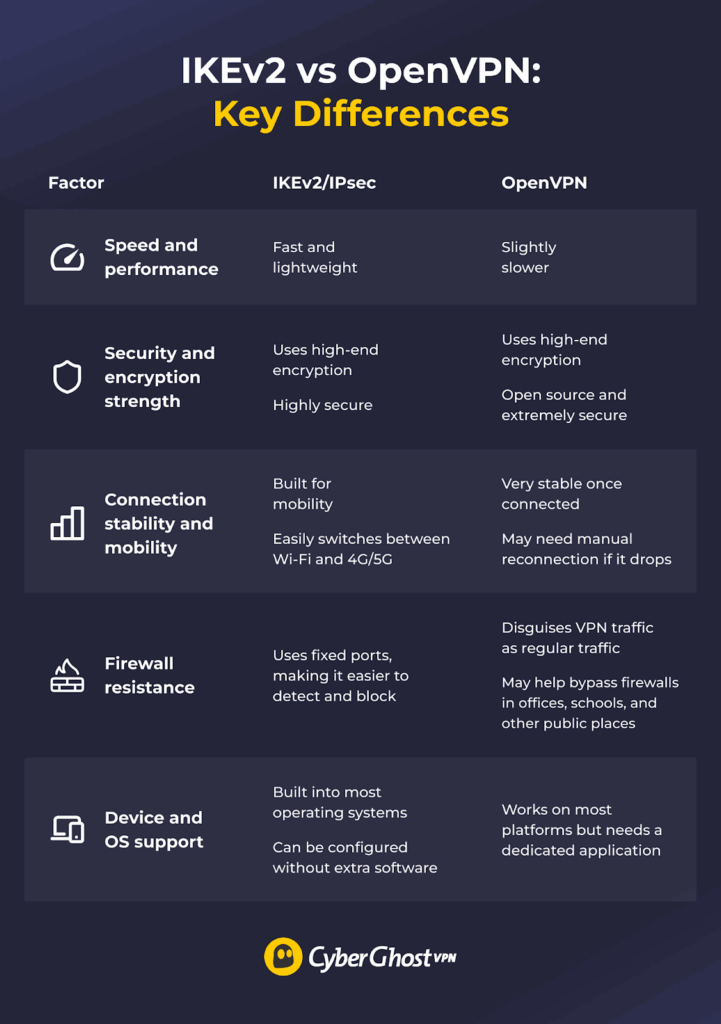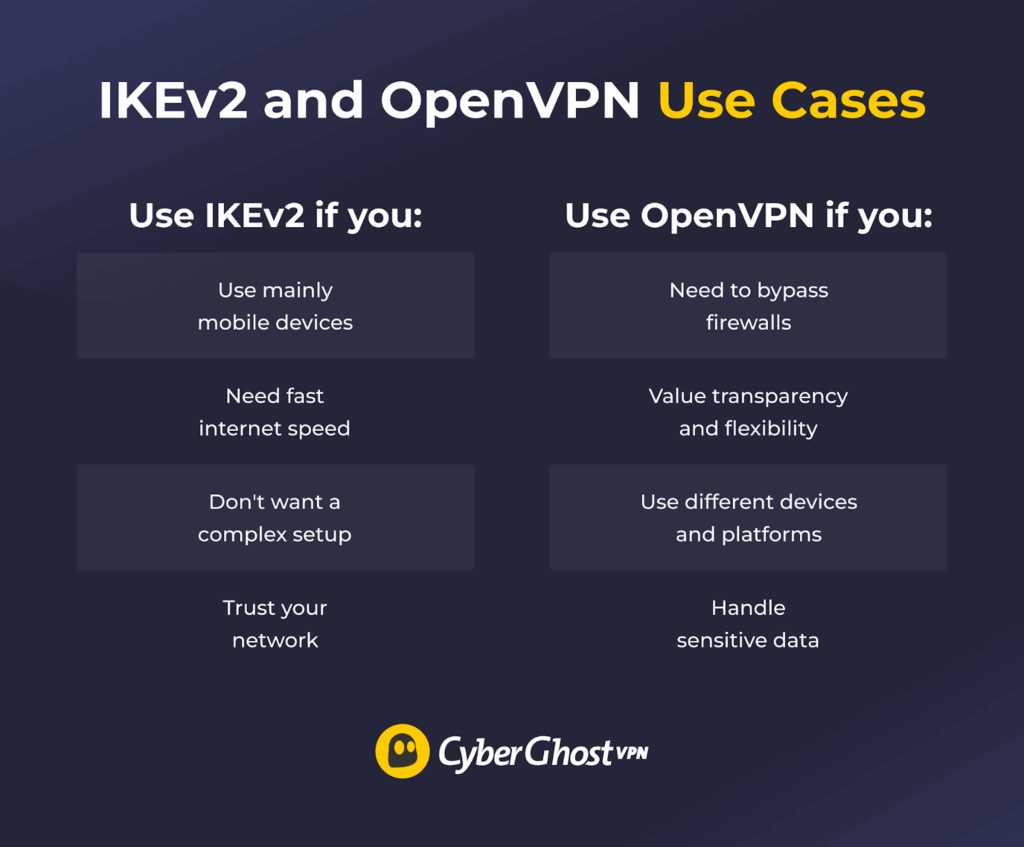Choosing the right VPN protocol can make a big difference in how your connection performs. Some prioritize speed, while others focus on connection stability or privacy. Among the most trusted options today are IKEv2 and OpenVPN. Both are secure, widely supported, and used by premium VPNs, but they’re built for different situations. Here’s how they compare and how to pick the right one for your device and needs.
What Is IKEv2 (IKEv2/IPsec)?
IKEv2, short for Internet Key Exchange version 2, is a VPN protocol developed by Microsoft and Cisco to create secure, stable connections between devices and a VPN. It’s paired with IPsec (Internet Protocol Security), which handles the actual encryption. Together, they form a strong security system commonly listed in VPN apps as IKEv2/IPsec.
Like other VPN protocols, IKEv2/IPsec creates a secure tunnel for your data. That means it secures your internet connection by scrambling your data and making it more difficult to track by online snoops. It uses powerful encryption algorithms (like AES 256), the same standard used by organizations that protect classified data.
What makes IKEv2/IPsec especially useful is its ability to maintain a stable connection when switching between networks. For example, if you move from Wi-Fi to mobile data, it quickly re-establishes the VPN tunnel without dropping the connection. This feature, called MOBIKE (Mobility and Multihoming), makes IKEv2 a top choice for mobile users.
What Is OpenVPN?
OpenVPN is one of the most popular and trusted VPN protocols. It’s open source, which means its code is publicly available and reviewed by experts for vulnerabilities. That transparency has made it a gold standard in the VPN industry. Unlike IKEv2, which relies on IPsec, OpenVPN uses SSL/TLS encryption, the same technology that protects secure HTTPS websites.
One of OpenVPN’s biggest strengths is its flexibility. You can generally choose from two variants. One works over UDP (User Datagram Protocol) and the other one uses TCP (Transmission Control Protocol). UDP offers faster performance, while TCP provides more reliability for tasks that need stable connections, like web browsing and file transfers.
Though OpenVPN is highly secure, it can be more resource-intensive than IKEv2 and newer protocols, like WireGuard®. It means that it may use slightly more battery or processing power on your device. Still, for many users, its proven security record and versatility make it one of the most reliable choices available.
IKEv2 vs OpenVPN: Key Differences Explained
Both IKEv2/IPsec and OpenVPN are excellent protocols, but they shine in different situations. Here’s how they stack up across the areas that matter most.

Speed and Performance
IKEv2/IPsec is generally faster than OpenVPN because it needs less processing power and works natively with most operating systems (so it doesn’t need a separate app). It reconnects quickly after interruptions and performs especially well on mobile devices where network changes are frequent.
OpenVPN, while still fast, can be slightly slower due to its extra layer of SSL/TLS encryption and its more complex setup process (it needs a separate app). The difference is often minor, but users on older devices or slower networks may notice it.
Security and Encryption Strength
Both IKEv2/IPsec and OpenVPN are highly secure; they just use different methods to provide the protection. OpenVPN most commonly combines SSL/TLS encryption with the AES-256-GCM algorithm. That means your data gets scrambled in a highly complex way. Even if someone gets to your encrypted data, it’s estimated that it would take billions of years to decrypt using current computers.
IKEv2/IPsec combines two protocols: IKEv2 for settings and reconnections and IPsec for encryption and authentication. It can also be paired with highly advanced encryption algorithms like AES 256, ChaCha20, and SHA-2. This combination makes it as secure as OpenVPN.
Connection Stability and Mobility
IKEv2/IPsec is built for mobility, thanks to its support for MOBIKE. This lets it maintain your connection when your device switches between networks (like moving from Wi-Fi to mobile data), so you’re less likely to deal with drops or interruptions.
OpenVPN can also reconnect after network changes, but it often requires a manual restart and isn’t as seamless as on mobile. On the plus side, OpenVPN offers exceptional reliability once the tunnel is established, and it’s less prone to random disconnections.
Firewall and Censorship Resistance
OpenVPN can use TCP port 443 (the same port used by HTTPS), which helps it blend more easily on networks with strict filtering or deep packet inspection (DPI). This makes it a viable choice in public spaces that restrict certain protocols.
IKEv2/IPsec uses fixed ports (UDP 500 and 4500), which makes it easier for tightly controlled networks to identify and block. As a result, an IKEv2/IPsec VPN might struggle to work on networks with strict firewall rules.
Device and OS Support
IKEv2/IPsec works natively on major operating systems, like Windows, macOS, iOS, and Android, so you can configure it directly in your device settings without installing additional software. Many VPN apps also include built-in support for it, making setup even easier.
OpenVPN is compatible with nearly every platform as well, including routers and NAS devices, but it requires a dedicated app or configuration tool. This makes it slightly less plug-and-play but much more flexible for advanced setups.
Choosing Between IKEv2 and OpenVPN: Use Cases
IKEv2/IPsec and OpenVPN both offer reliable privacy protection, but your personal VPN use will determine which is best.

When to Use IKEv2
IKEv2/IPsec shines when speed, stability, and mobility matter most. You might prefer IKEv2 if you:
- Use mobile devices often: It keeps your VPN connection stable when switching networks.
- Need fast performance: Minimal encryption overhead means less impact on speed.
- Prefer simple setup: It’s built into most operating systems, so it works out of the box.
- Trust your network: Works best in regions with open internet networks, where firewalls aren’t restrictive, and internet providers don’t block VPN connections.
When to Use OpenVPN
OpenVPN is the best choice when security, compatibility, and flexibility are top priorities. You might prefer OpenVPN if you:
- Need to bypass firewalls: It can disguise VPN traffic as normal web traffic, making it more reliable at retaining access to websites.
- Value transparency and flexibility: OpenVPN’s open-source nature allows constant audits and custom configurations.
- Use many devices and platforms: It runs on nearly every operating system and supported router.
- Handle sensitive data: Its advanced integrations with different encryption algorithms provide top-level protection for your sensitive data.
IKEv2 vs OpenVPN: Different Tools, Same Mission
There’s no universal “best” VPN protocol, only the one that fits how and where you connect to a VPN. IKEv2/IPsec feels effortless on mobile devices, while OpenVPN is the all-rounder, flexible and strong enough to provide reliable and stable connections. Therefore, the best option would be to use a VPN provider that gives you both of these protocols. That way, you can switch between them based on what you do online.
CyberGhost VPN includes both IKEv2/IPsec and OpenVPN, as well as WireGuard®, which is a newer VPN protocol that also delivers high-end speed and tough online security. Also, CyberGhost VPN works on mobile and desktop devices and gives you 7 simultaneous connections, keeping you protected at home and on the go.
FAQ
What are the main differences between IKEv2 and OpenVPN in terms of speed and stability?
IKEv2 (typically combined with IPsec) is generally faster and more stable on mobile devices. It reconnects quickly when switching between Wi-Fi and mobile data. OpenVPN is slightly slower because of its heavier encryption and other security protocols, which require additional processing power. However, it offers excellent reliability across devices and even works on restricted networks.
Is IKEv2 more secure than OpenVPN for protecting online privacy?
Both IKEv2 and OpenVPN are highly secure when configured properly. They are commonly combined with AES-256, which is a type of encryption that’s practically impossible to crack. On top of that, OpenVPN is also paired with SSL/TLS encryption, the same technology that secures HTTPS websites. In practice, both offer industry-grade privacy and protection.
Which VPN protocol works better for mobile devices: IKEv2 or OpenVPN?
IKEv2/IPsec works better for mobile users because it handles network changes effectively. It keeps connections active while moving between networks, like Wi-Fi and 4G/5G. OpenVPN may drop connections during such switches, making it a solid option for desktop computers and routers.
Can IKEv2 or OpenVPN bypass firewalls more effectively?
OpenVPN is typically more effective against strict firewalls. It can run on TCP port 443, the port used by HTTPS traffic, making it difficult for networks to block. IKEv2 uses UDP ports 500 and 4500, which firewalls and restrictive networks can easily block.
Which protocol should I choose for gaming, streaming, and P2P?
For gaming and streaming, IKEv2/IPsec offers faster speeds and lower latency. OpenVPN is more dependable when connecting over restricted networks or for P2P file sharing. The best choice depends on your use case and connection type.


Leave a comment